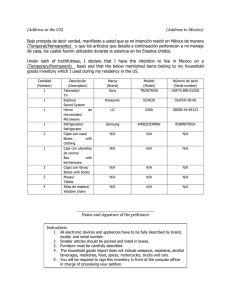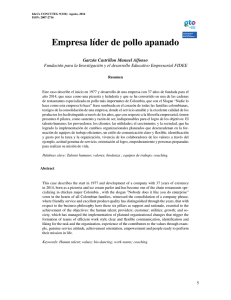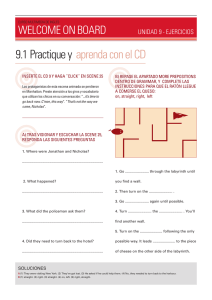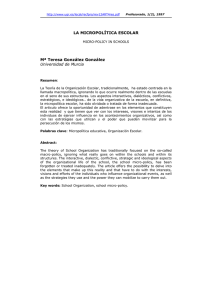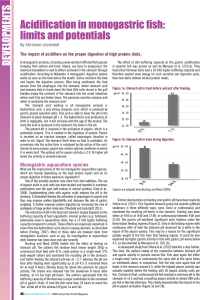Gastroparesis - Spanish - Health Information Translations
Anuncio
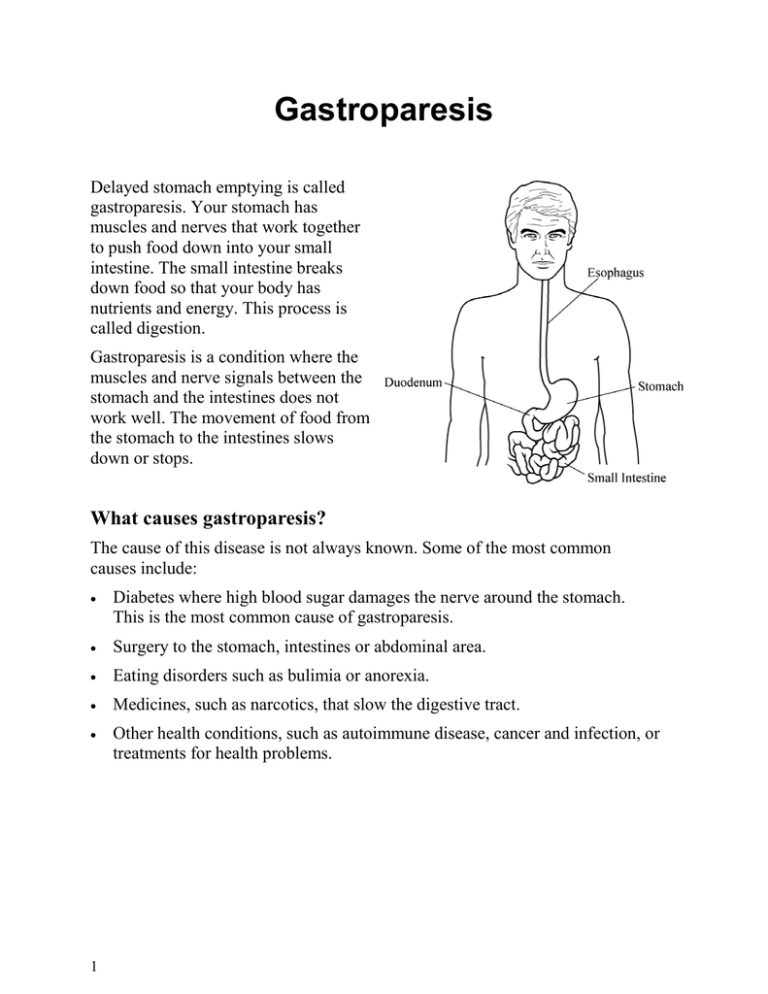
Gastroparesis Delayed stomach emptying is called gastroparesis. Your stomach has muscles and nerves that work together to push food down into your small intestine. The small intestine breaks down food so that your body has nutrients and energy. This process is called digestion. Gastroparesis is a condition where the muscles and nerve signals between the stomach and the intestines does not work well. The movement of food from the stomach to the intestines slows down or stops. What causes gastroparesis? The cause of this disease is not always known. Some of the most common causes include: • Diabetes where high blood sugar damages the nerve around the stomach. This is the most common cause of gastroparesis. • Surgery to the stomach, intestines or abdominal area. • Eating disorders such as bulimia or anorexia. • Medicines, such as narcotics, that slow the digestive tract. • Other health conditions, such as autoimmune disease, cancer and infection, or treatments for health problems. 1 Gastroparesia El vaciamiento tardío del estómago se conoce como gastroparesia. Su estómago tiene músculos y nervios que trabajan en conjunto para enviar la comida a su intestino delgado. El intestino delgado descompone los alimentos para que el cuerpo tenga nutrientes y energía. Este proceso se conoce como digestión. La gastroparesia es una afección en la que los músculos y las señales nerviosas entre el estómago y los intestinos no funcionan bien. El movimiento de comida del estómago a los intestinos se ralentiza o se detiene. Esófago Duodeno Estómago Intestino delgado ¿Qué causa la gastroparesia? La causa de esta enfermedad no siempre es conocida. Algunas de las causas más comunes son: • Diabetes, donde el alto contenido de glucosa en sangre daña los nervios alrededor del estómago. Esta es la causa más común de la gastroparesia. • Cirugía de estómago, intestinos o en el área abdominal. • Trastornos alimenticios como bulimia o anorexia. • Medicamentos como los narcóticos, que ralentizan el tracto digestivo. • Otras afecciones de salud, como enfermedades autoinmunes, cáncer e infecciones, o tratamientos de problemas de salud. Gastroparesis. Spanish. 1 Signs Signs may be mild to severe. Raw fruits and vegetables, high fiber foods, fatty foods and carbonated drinks can make signs worse. Signs include: • Nausea • Vomiting undigested food • Heartburn • Bloating • Pain or spasms in the stomach area • Lack of appetite • Feeling full after a few bites of food • Very high or very low blood sugar levels Testing After a physical exam, you may have blood tests. Other tests may be done to check for stomach or intestine blockage or other problems. Tests may include: • Upper endoscopy: This test allows the doctor to see inside your mouth, esophagus and stomach. A thin tube that has a light and camera inside is put in through your mouth and passed down into your stomach. • Ultrasound: This test uses sound waves to get pictures of the organs in your abdomen. • Barium x-ray: During this test, you will be given a drink that has barium in it. The barium shows up on the x-ray to show how well your stomach works. 2 Signos Los signos pueden ser de leves a graves. Las frutas y verduras crudas, alimentos con alto contenido de fibras, alimentos grasos y bebidas carbonatadas pueden empeorar los signos. Los signos incluyen: • Náuseas • Vomitar alimentos no digeridos • Acidez estomacal • Hinchazón • Dolor o espasmos en el área estomacal • Falta de apetito • Sensación de saciedad después de algunos bocados de comida • Niveles muy altos o muy bajos de glucosa en sangre Exámenes Después de un examen físico, tal vez le hagan análisis de sangre. Tal vez le hagan otros análisis para comprobar que no tenga bloqueos estomacales u otros problemas. Los análisis pueden incluir: • Endoscopía superior: este análisis le permite al médico ver dentro de su boca, esófago y estómago. Un tubo fino que tiene una luz y una cámara en el interior se coloca a través de su boca y pasa hasta su estómago. • Ecografías: este análisis usa ondas de sonido para obtener imágenes de los órganos de su abdomen. • Radiografía con bario: durante este análisis, le darán una bebida con bario. El bario se ve en la radiografía, y muestra qué tan bien funciona su estómago. Gastroparesis. Spanish. 2 Treatment The goal of treatment is to manage the signs you have. Even with treatment, it may not completely stop gastroparesis. Treatment may include: • Medicines. • Changing your eating habits, such as eating 6 small meals each day. Your doctor or dietitian may also have you try eating liquid meals to help control your signs. • Controlling your blood sugars if you have diabetes. You may need to check your blood sugar levels often and work closely with your doctor or diabetes educator to adjust your insulin. • Surgery Talk to your doctor or nurse if you have any questions or concerns. 1/2012 Health Information Translations Unless otherwise stated, user may print or download information from www.healthinfotranslations.org for personal, non-commercial use only. The medical information found on this website should not be used in place of a consultation with your doctor or other health care provider. You should always seek the advice of your doctor or other qualified health care provider before you start or stop any treatment or with any questions you may have about a medical condition. Wexner Medical Center at The Ohio State University, Mount Carmel Health System, OhioHealth and Nationwide Children’s Hospital are not responsible for injuries or damages you may incur as a result of your stopping medical treatment or your failure to obtain medical treatment. 3 Tratamiento La meta del tratamiento es aliviar los signos que tenga. Incluso con tratamiento, podría no detenerse completamente la gastroparesia. El tratamiento puede incluir: • Medicamentos. • Cambiar sus hábitos alimenticios, como comer 6 porciones pequeñas por día. Su médico o nutricionista también podrían pedirle que intente hacer comidas líquidas para ayudar a controlar sus signos. • Controlar sus niveles de glucosa en la sangre si tiene diabetes. Tal vez deba medir sus niveles de glucosa en sangre con frecuencia y trabajar de cerca con su médico o educador de diabetes para ajustar su insulina. • Cirugía. Hable con su médico o enfermera si tiene alguna pregunta o duda. 1/2012 Health Information Translations Unless otherwise stated, user may print or download information from www.healthinfotranslations.org for personal, non-commercial use only. The medical information found on this website should not be used in place of a consultation with your doctor or other health care provider. You should always seek the advice of your doctor or other qualified health care provider before you start or stop any treatment or with any questions you may have about a medical condition. Wexner Medical Center at The Ohio State University, Mount Carmel Health System, OhioHealth and Nationwide Children’s Hospital are not responsible for injuries or damages you may incur as a result of your stopping medical treatment or your failure to obtain medical treatment. Gastroparesis. Spanish. 3
